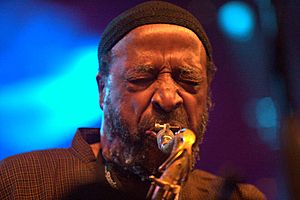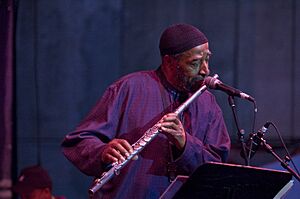Yusef Lateef facts for kids
Quick facts for kids
Yusef Lateef
|
|
|---|---|

Lateef in a 2007 performance
|
|
| Background information | |
| Birth name | William Emanuel Huddleston |
| Also known as | Yusef Lateef |
| Born | October 9, 1920 Chattanooga, Tennessee, U.S. |
| Died | December 23, 2013 (aged 93) Shutesbury, Massachusetts |
| Genres | New-age, jazz, post-bop, jazz fusion, swing, hard bop, third stream, world music |
| Occupation(s) | Musician, composer, educator, spokesman, author |
| Instruments | Tenor saxophone, flute, oboe, bassoon, bamboo flute, shehnai, shofar, arghul, koto, piano, vocals. |
| Years active | 1955–2013 |
| Labels | Savoy, Prestige, Verve, Riverside, Impulse, Atlantic, CTI, YAL |
| Associated acts | Cannonball Adderley |
Yusef Abdul Lateef (born William Emanuel Huddleston; October 9, 1920 – December 23, 2013) was an amazing American musician. He played many instruments and wrote music. He was also an important member of the Ahmadiyya Muslim Community in America.
Yusef Lateef was a master of the tenor saxophone and flute. But he didn't stop there! He also played unusual instruments for jazz, like the oboe and bassoon. He even played instruments from other parts of the world, such as the bamboo flute, shanai, shofar, arghul, and koto. He was famous for mixing jazz with music from "Eastern" cultures. People said he played world music before that term even existed!
Lateef also wrote books, including two short novels and collections of short stories. He wrote his own life story, called The Gentle Giant. He owned a music publishing company, Fana Music, where he published his own music books and compositions.
Contents
Yusef Lateef's Life Story
Early Years and Musical Start
Yusef Lateef was born William Emanuel Huddleston in Chattanooga, Tennessee. His family moved a few times when he was very young. First, they went to Lorain, Ohio, in 1923. Then, in 1925, they moved to Detroit, Michigan. In Detroit, his father changed the family's last name to Evans.
Growing up in Detroit, Lateef met many future jazz stars. These included Milt Jackson, Paul Chambers, Elvin Jones, and Kenny Burrell. By the time he finished high school at 18, Lateef was a skilled saxophonist. He started his music career touring with swing bands. He first bought an alto saxophone, but soon switched to the tenor saxophone. He was inspired by the famous saxophonist Lester Young.
In 1949, a legendary jazz trumpeter, Dizzy Gillespie, invited Lateef to join his orchestra for a tour. In 1950, Lateef went back to Detroit. He began studying how to compose music and play the flute at Wayne State University. During this time, he became a Muslim and joined the Ahmadiyya Muslim Community. He changed his name to Yusef Abdul Lateef. He even traveled to Mecca twice, which is a very important pilgrimage for Muslims.
Becoming a Famous Musician
Yusef Lateef started recording his own music in 1957. He worked with labels like Savoy Records and Prestige Records. Musicians like Wilbur Harden and Hugh Lawson often played with him.
By 1961, his unique sound was very clear on albums like Into Something and Eastern Sounds. You could really hear his "Eastern" influences. He used instruments like the rahab, shanai, arghul, koto, and Chinese wooden flutes. Even his oboe playing sounded special and different in his music. He mixed jazz songs, blues, and film music. From 1962 to 1964, he was also a member of Cannonball Adderley's Quintet. He played on many other artists' albums too.
In the late 1960s, Lateef started adding soul and gospel sounds to his music. This was before jazz fusion became popular. Yusef Lateef didn't like the words "jazz" or "jazz musician." He felt they didn't fully describe his wide range of musical styles. In the 1980s, he explored new-age and spiritual sounds.
Lateef also loved learning. In 1960, he went back to school at the Manhattan School of Music in New York City. He earned a bachelor's degree in music in 1969 and a master's degree in music education in 1970. He started teaching his own special music courses there in 1971. He became a professor at the Borough of Manhattan Community College in 1972.
In 1975, Lateef earned a special doctorate degree from the University of Massachusetts Amherst. His studies compared Western and Islamic education. He then worked as a researcher in Nigeria in the early 1980s. When he returned to the United States in 1986, he taught at the University of Massachusetts Amherst and Hampshire College.
Later Career and Awards

In 1987, his album Yusef Lateef's Little Symphony won a Grammy Award. Even with this award, he always said, "My music is jazz."
In 1992, Lateef started his own record label, YAL Records. In 1993, a German radio orchestra asked him to write a big piece of music. It was called The African American Epic Suite. This four-part work was about slavery and unfair treatment in the United States. Famous orchestras like the Atlanta Symphony Orchestra have performed it.
In 2010, he received the Jazz Master Fellowship Award from the National Endowment for the Arts. This is the highest honor given in jazz music. The Manhattan School of Music, where he studied, gave him a special award in 2012.
Yusef Lateef continued to teach at universities in Massachusetts until the end of his life. He passed away from prostate cancer on December 23, 2013, at 93 years old. He was survived by his wife, Ayesha, and his son, Yusef.
After he passed away, his family sold many of his instruments. They hoped other musicians would continue to play them. The musician Jeff Coffin bought Lateef's main tenor saxophone and his bass flute. In 2020, the University of Massachusetts celebrated 100 years since Lateef's birth. They created an online exhibit and video tributes from many artists.
Discography
Personal Life
Yusef Lateef once said that his strongest childhood memory was his "passion for nature." His first wife, Tahira, passed away before him. He also outlived a son and a daughter.
Images for kids
See also
 In Spanish: Yusef Lateef para niños
In Spanish: Yusef Lateef para niños
 | Frances Mary Albrier |
 | Whitney Young |
 | Muhammad Ali |



